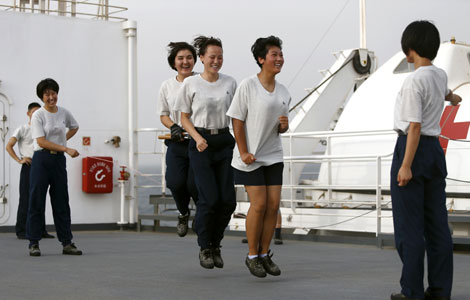New nano-tech could treat China's lake pollution
Updated: 2013-09-09 16:10
(Xinhua)
|
|||||||||||
HEFEI -- Chinese scientists announced on Monday that they have developed a type of nanomaterial which can catalyze algae masses growing on water surfaces into inorganic earth.
Chinese lakes are often plagued by catastrophic outbreaks of blue-green algae. Triggered by vast amounts of sewage water drained into rivers and lakes, it can exude an unusually bad odor, suffocate fishery stocks and turn water into a milky green shade. Algae pollution has been a particular problem in three of China's major freshwater lakes -- Chaohu, Taihu and Dianchi.
Chinese governments at multiple levels have invested billions of yuan in recent years to treat the pollution. But large blooms of algae, although reduced in density, still persist in times of sufficient heat and sunshine, conditions that are favorable for its growth.
Scientists with the Chinese University of Science and Technology said on Monday that their laboratory tests had showed a single gram of the new nanomaterial that can kill algae floating in an area equal in size to a basketball court.
Fan Chongzheng, who led the research, said that the catalyzer leads to a biodegradation of the algae into an inorganic earthenlike substance.
He added that lab tests were conducted on water covered with a density of algae of over 100 million particles per liter. The water of Chaoku Lake, home to the most serious algae pollution among China's major lakes, is covered with a density of algae of over 5 million particles per liter.
The 13,000-square km lake, located in east China's Anhui province, is surrounded by fast-growing cities. Heavy use and local industrial development in recent years have made it one of the country's most polluted lakes.
Sewage discharge has brought excessive amounts of nitrogen and phosphorus to the lake, incurring eutrophication of water, fueling the algae outbreak.
The development and reform commission in the provincial capital of Hefei pledged last year that facilities that can handle 5,000 to 10,000 tons of wastewater per day will be built in every township surrounding Chaohu Lake by 2015.
Fan said that the biological treatment, along with the government's measures to intercept sewage from urban areas, can together solve the algae pollution conundrum.
He said the project team will conduct field studies at the lake, before reporting the research results to concerned central government departments for the application.
Related Stories
China pledges safe rural drinking water by 2015 2013-08-29 20:03
China unveils plan to treat water, soil losses 2013-08-16 10:02
Five-year plan to treat water, soil losses 2013-08-16 01:22
China to regulate water supplies amid water diversion 2013-08-10 16:17
Shanghai sharply increases water fees 2013-07-31 10:49
Today's Top News
2 dead after S China school blast
China will stay the course on sustainable growth
Syria issue should be handled within UN framework
Chinese president arrives in Uzbekistan for visit
China's inflation slows to 2.6%
Belgian PM 'confident' in China's economy
Network to take care of mentally ill
Trending news across China
Hot Topics
Lunar probe , China growth forecasts, Emission rules get tougher, China seen through 'colored lens', International board,
Editor's Picks

|

|

|

|

|

|





